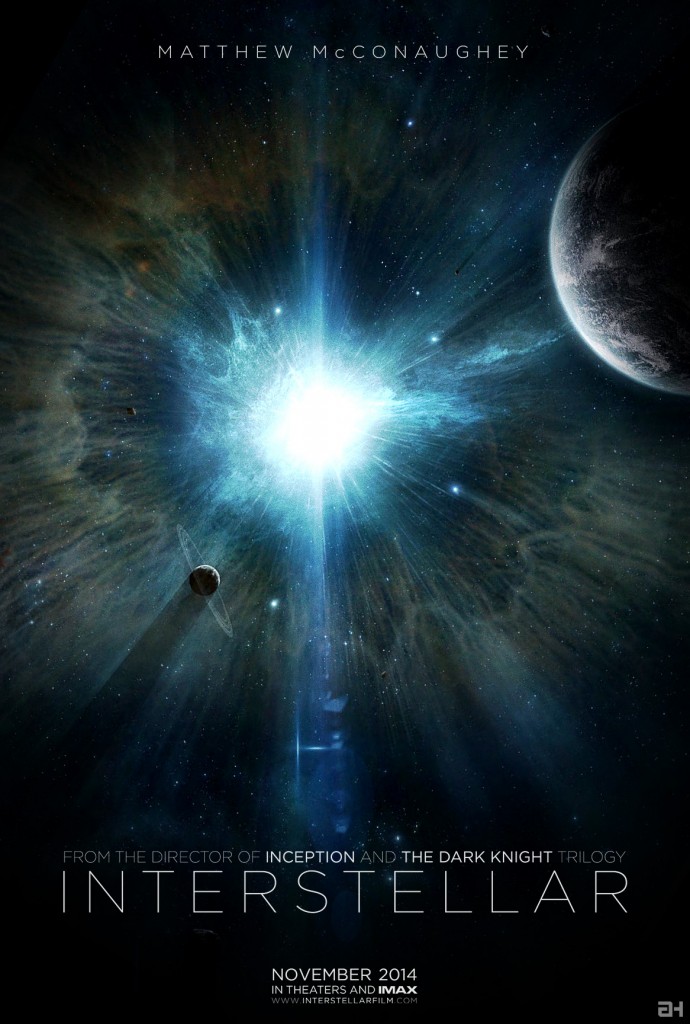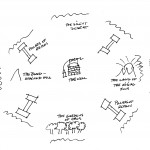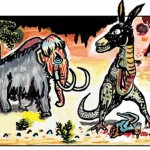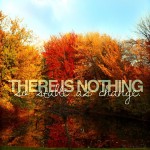I just saw the trailer for the movie, Interstellar, coming out in November. The premise appears to be that catastrophic food shortages threaten the human species. I think it’s implied that this was caused by humankind’s own shortsighted actions and their effect on the biosphere. As a result, humans are forced to travel outside the solar system in search of another planet to colonize.
As it so happens, I just finished reading the second of Octavia Butler’s parable series, Parable of the Talents, which has an overlapping theme with Interstellar. Octavia Butler was one of the first African-American science fiction writers, and one of the first women to break the science fiction gender barrier. In two of her novels, The Parable of the Sower (1993) and The Parable of the Talents (1998), Butler describes a an invented religion called “Earthseed” In the novels, Butler includes many verses from a fictional book of scripture called “The Book of the Living”, which sets forth the basic theology, ethics, and eschatology of Earthseed.
Earthseed’s three main tenets are –
The Destiny of Earthseed is to take root among the stars.
I’ve written about the first two tenets here before. I think there are a lot of similarities with Neo-Pagan theology, especially as articulated in the writings of Starhawk, Carol Christ, and Constance Wise.
When I wrote about the first book in Butler’s series, Parable of the Sower, I wrote about only the first two tenets and ignored the third. Honestly, the third tenet, the “Destiny”, didn’t appeal to me at first. The idea of escaping this planet to go to the stars seemed, well … escapist. It seemed like a way of avoiding the real consequences of our way of life on this planet. But the more, I read of the second book, Parable of the Talents, the more the Destiny started to make sense to me.
Butler writes in her fictional Book of the Living:
The Destiny of Earthseed
Is to take root among the stars.
It is to live and to thrive
On new earths.
It is to become new beings
And to consider new questions.
It is to leap into the heavens
Again and again.
It is to explore the vastness
Of heaven.
It is to explore the vastness
Of ourselves.
Butler’s character Lauren Olamina, the young founder and leader of Earthseed, explains that the Destiny is Earthseed’s vision of heaven or immortality. Because Earthseed is a naturalistic religion (meaning it eschews supernaturalistic explanations), Earthseed’s heaven is literally in the heavens — i.e., in space. And while we likely will not reach it in any of our lifetimes, we don’t get there by dying. While there is no personal immortality in Earthseed, the Destiny creates the possibility of a species immortality. Olamina explains in “The Book of the Living”:
Alone,
Each of us is mortal.
Yet through Earthseed,
Through the Destiny,
We join.
We are purposeful
Immortal
Life!
And while our individual morality may not determine whether any of us get to the heavens, how we collectively live will determine whether we get there at all.
Now, the Pagan in me wants to revolt at this idea as escapism, and the skeptic in me suspects it as fantasy. But the Destiny that Olamina describes is neither irresponsible, nor unrealistic. Many Pagans, pantheists, and religious naturalists believe the concept of heaven is at the root of our environmental crisis. But because Earthseed’s heaven is material, the Destiny has very real practical benefits for us and the planet in the here and now. Olamina explains: “The Destiny is important for the lessons it forces us to learn while we’re here on Earth, for the people it encourages us to become. It’s important for the unity and purpose that it gives us here on Earth. And in the future, it offers us a kind of species adulthood and species immortality when we scatter to the stars.”
Olamina goes on to explain that the Destiny has the potential to create a kind of species-consciousness for humankind, to bring us together to work toward a common goal, and to do so in a sustainable way with the Earth.
“I wanted us to understand what we could be, what we could do. I wanted to give us a focus, a goal, something big enough, complex enough, difficult enough, and in the end, radical enough to make us become more than we ever have been. We keep falling into the same ditches, you know? I mean, we learn more and more about the physical universe, more about our own bodies, more technology, but somehow, down through history, we go on building empires of one kind or another, then destroying them in one way or another. We go on having stupid wars that we justify and get passionate about, but in the end, all they do is kill huge numbers of people, maim others, impoverish still more, spread disease and hunger, and set the stage for the next war. And when we look at all of that in history, we just shrug our shoulders and say, well, that’s the way things are. That’s the way things always have been. …
“There seem to be solid biological reasons why we are the way we are. If there weren’t, the cycles wouldn’t keep replaying. The human species is a kind of animal, of course. But we can do something no other animal species has ever had the option to do. We can choose: We can go on buildings and destroying until we either destroy ourselves or destroy the ability of our world to sustain us. Or we can make something more of ourselves. We can grow up. We can leave the nest. We can fulfill the Destiny, make homes for ourselves among the stars, and become some combination of what we want to become and whatever our new environments challenge us to become. Our new worlds will remake us as we remake them. … Earthseed is about preparing to fulfill the Destiny. It’s about learning to live in partnership with one another in small communities, and at the same time, working out a sustainable partnership with our environment. It’s about treating education and adaptability as the absolute essentials that they are. …”
I think the Earth-seed metaphor is key here. If you want to spread the seeds of a tree, you don’t chop down the mother tree. You care for it and nature it so that it can continue to produce seeds. The Earth is the mother tree for Earthseed.
Olamina proposes the Destiny as the alternative to the post-apocalyptic world she lives in, where the United States has exhausted its physical and moral resources, education has become more a privilege of the rich than the basic necessity, where convenience, profit, and inertia excused greater and more dangerous environmental degradation, where poverty, hunger, disease became inevitable for more and more people, where people have become commodities … a world that looks increasingly like our own every day.
As for whether the Destiny is realistic, Olamina has no illusions about it, but she points out that there is nothing logically impossible about it either. It would be incredibly difficult. But that’s the point, in fact. We need something “big enough, complex enough, difficult enough”, but still possible, to bring us together, in a way that not even the immanent destruction of this planet’s ability to support human life has been able to. The Destiny is so challenging, we might just be forced into a paradigm shift. We might just move beyond the ideal of international cooperation to a truly global community. And because every human being might potentially provide a breakthrough necessary to achieve this monumental goal, universal health and education would be seen as a necessity, not a luxury.
While I’m sure many Pagans will be uncomfortable with the colonialist mentality of the Destiny, I don’t think it is necessarily inconsistent with a Neo-Pagan ethos. In fact, I could see Earthseed becoming a Neo-Pagan tradition in its own right. (It wouldn’t be the first Pagan religion inspired by a science fiction novel.) I’ll be writing more about Earthseed in the future, but I welcome your thoughts in the meantime.

















